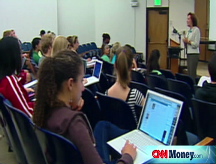A letter to my college-bound daughter
As my eldest heads to campus, her old man has a few parting financial tips.
| (or part of name) |
|
|
(Money Magazine) -- Dear Lexie,
On your first day of college, let me congratulate you on your well-earned freedom. No more curfews. No more being dragged places you'd rather not be. No more of Dad's teachable moments about responsibility, opportunity...life. And no more boring lessons about after-tax income, saving, borrowing, compound returns and growth stocks.
While we're on the subject of "no more," let me gently mention that it applies to the car you've been driving too, and my gas card and your allowance. Freedom, you see, has its price. Sorry, I couldn't resist one more teachable moment.
I know that you will study hard and explore all the great things that a university has to offer. You are ready for this and, frankly, so am I. Your freedom and a degree of mine come wrapped together.
Yet I can't help but worry that you may get tripped up with money issues. It's easy to do, especially when you're just starting out. But happily, it's also fairly easy to avoid. So if you'll indulge me one last time, I'd like to offer some parting financial wisdom for your first semester and beyond.
You are fortunate to have parents that can take care of your biggest bills - tuition, room and board, transportation home. But the rest, dear child, is up to you. It would be a shame for you to end up in debt with your modest earning ability right now (the average credit-card balance for college seniors: nearly $3,000).
So estimate all of your expenses over the next 17 weeks and compare that with your available resources. Looking at the whole semester, not just a sample week, makes plain how recurring expenses add up - like, say, $4 a day at Starbucks setting you back nearly $500.
Separate your spending into categories, such as books, laundry, entertainment, food and beverages (spare me the details about what kind of beverages).
"Keep an envelope for each, and place all of your receipts in those envelopes so you can go back and count what you spent where," says Douglas Andrew, author of Millionaire by Thirty. "That way you'll quickly recognize where you may be going overboard."
Make adjustments as needed. But when you add to one category, be sure you subtract from another. If money runs tight, don't default to a part-time job unless you'd really enjoy it or it's truly a last option. You worked hard all summer and saved enough to get by. Cut your expenses instead. That's a lifetime skill worth developing now.
I have a confession: In the past few months I have - without telling you - thrown away at least a dozen credit-card offers to you. This bombardment will continue when you move to campus.
Why do credit-card companies want to hook you before you have income? They're in it for the long term. Issuers know that people tend to be loyal to their first credit card; get it in college and you're likely to still be using it years later. So they will not stop the barrage, and even without me as your guardian filter, I hope you'll keep throwing the offers away.
You need only one - a Visa, a MasterCard or an American Express. Later, when you've proved you can manage one card, I want you to add two others - a department store card and a gas card - to help build a good credit rating.
In each case, never charge more than 30% of your credit limit and pay in full every month. But just to be safe, authorize an appropriate automatic monthly payment to protect you from late fees and a credit blemish.
You don't yet appreciate how important a good credit history is. When you graduate, your credit rating will be looked at by landlords, utility companies, cell-phone providers, banks (if you buy or lease a car) and even employers.
"The worst thing you can do is miss a payment," says Ellen Cannon, managing editor of Bankrate.com. "That will damage your credit score, which is the basis of your financial life."
Look for a low-rate student card with no annual fees, like Citi mtvU Platinum Select Visa for College Students (0% interest for six months; 13.99% thereafter) or Blue Cash from American Express (0% interest for the first six months; then 8.99% to 15.99%, depending on your credit history; and a cashback feature for purchases).
I don't often get excited by a 0% introductory rate. But in this case it's a nice feature. You may charge more than you expect initially buying books and setting up your dorm room - and have to carry a balance for a month or two.
Even if you don't have to, take at least one economics and one personal-finance course. High schools don't teach much about budgets and credit or supply and demand.
These courses will open your eyes to how money works in the real world and introduce you to practical skills you'll use the rest of your life. They will also, finally, give you an inkling of what your dad's been writing about for 25 years.
Don't get caught up in talk on campus about which majors are the best stepping stones to financial success. You'll hear plenty of that from kids who want or may be under pressure to get a quick return from their education. Forget them. Many of those kids will end up disliking their jobs and muddling through so-so careers.
You can make a great living doing almost anything, as long as you love it. So take risks. Explore. Switch majors. Get your head out of the books and do something surprising. There's time. But find your bliss and pursue it.
Go ahead and get fluent in Spanish and study abroad if that makes your heart sing. Your knowledge and experience will pay off later on, I promise - just as you'll be rewarded for the joy you bring to tasks that excite you.
So that's it, Lexie. Of course I'll be available for more advice anytime - for the price of a phone call. Judging by how eagerly you packed your things, though, I recognize that my time would be ill spent sitting in front of the telephone waiting. That's okay, I won't. We're both ready.
Love always, Dad
How does your religion affect your finances? Money Magazine is seeking families willing to discuss the dollars-and-cents expenses involved in practicing their faith - the cost of everything from religious schools and dietary restrictions to tithing and faith-based investment limitations. If interested, please email your name, contact information and family photo, along with a brief summary of your salary, savings and religion-related expenses, to gmannes@moneymail.com. ![]()




